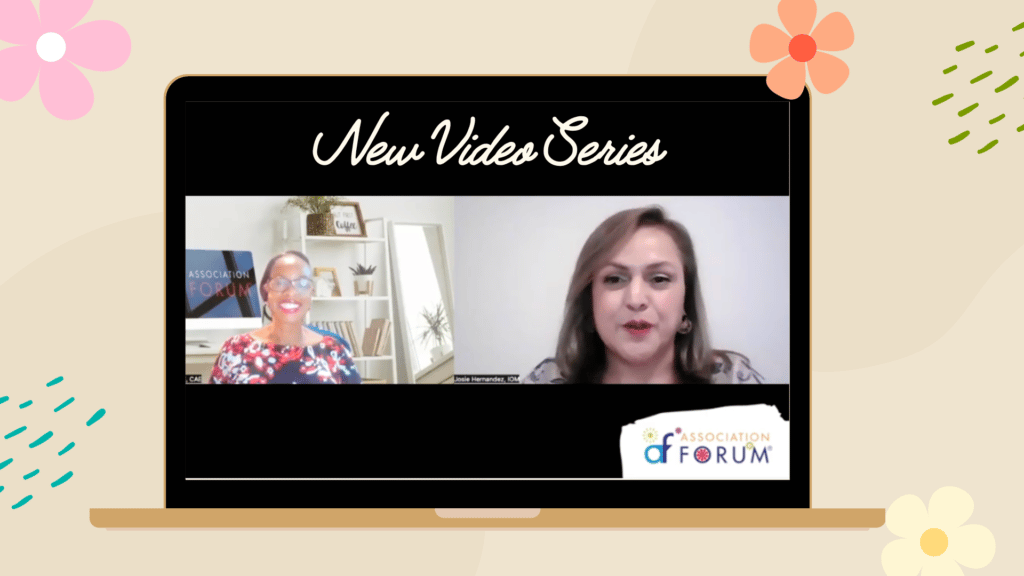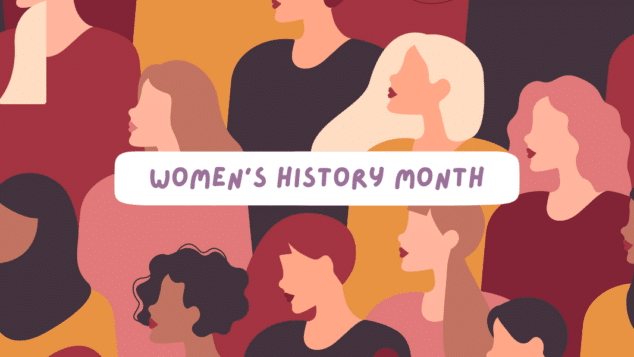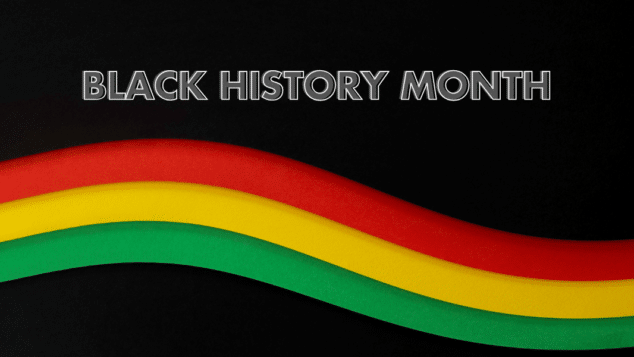VIDEO | Josie Hernandez on What Hispanic Heritage Month Means to Her

In the U.S., September 15 – October 15 is Hispanic Heritage Month. This is a time to celebrate Hispanic cultures, identities and contributions. Association Forum is celebrating the month by speaking with Latinx association professionals on their unique journeys to the industry. Josie Hernandez, IOM, is an account executive at Bostrom and executive director of DONA International. She is also the co-chair of Association Forum’s Latinx Advisory Group, who helped put together this video series.
Watch the video below to find out what Hispanic Heritage Month means to her, how she found her way to the association industry, and how she believes the industry can become more inclusive to Latinx professionals.
Read the Transcript
Artesha Moore: Hello, I’m Artesha Moore, President and CEO of Association Forum, and today I have Josie Hernandez here with me. Josie, let me have you introduce yourself.
Josie Hernandez: Thank you, Artesha. I am Josie Hernandez. I am currently an Account Executive at Bostrom based out of Chicago. Bostrom is an association management company and I serve as Executive Director for Dona International.
Artesha Moore: Josie, one of the things that we’ve done in these videos is really talk a little bit about the career journey. So can you tell us a little bit about where you came from to get to where you are at Bostrom today?
Josie Hernandez: Oh, sure. I love that question. That’s a great question. So I guess I always think it’s good to also start kind of at the beginning and give people a little bit of background about yourself. So I am born and raised in Chicago, which is a big part of my identity. So my parents are from Mexico. They are from a very small town in Zacatecas, which is a beautiful state and their small town is Momax. My dad immigrated here in the late sixties and then married my mom and brought her over. And so I was born here and I had four sisters and we were all born here. So we went to grammar school, high school, we lived in the South Chicago neighborhood of Chicago, which just also to give some point of reference is where the first Hispanic church was established in the city of Chicago. So, somehow religion always kind of establishes communities so I think it’s a just important to share about where I grew up in that frame of reference in terms of Chicago and its identity with the Latino community.
So, I went to grammar school and high school and then went to study at the University of Illinois at Urbana-Champaign. At that time, it was all about the big 10 experience, which it was something I was looking forward to and wanting to be a part of. I always been very interested in fashion, that is kind of my go-to point of interest and everything else outside of work and other things. So I did study marketing of textiles and apparel. At one time the US had a textile industry and they had a program there in the College of Agriculture so that’s what I studied. And getting now to my point of business. When I graduated, I started working in the retail industry in retail management, and I had considered moving out of Chicago, but based on family, I decided to stay here. The reason I share that is because there are limited opportunities to other things that I wanted to do within the retail industry.
So I kind of went into retail management and I did that for the… I say this is, association management, is my second career journey. And so the first part of my career was based in retail and I managed several stores throughout the Chicagoland area and did my career working for Retail Brand Alliance. They had stores called Casual Corner, if you remember those, and they had a flagship store on Michigan Avenue at 420 North Michigan and I closed that store up for them. At that point, I stayed home for just a year, cause I knew I couldn’t stay home that long, I had a daughter and then I knew that I didn’t want to go back into retail. As much as I loved it, the work-life balance, I was looking for something different. So I took a part-time job, worked for an insurance agency. And then someone that I knew referred me to a job at their work, which was at the Institute of Real Estate Management and that was my first foray into association management. That was in 2012.
And so I’ve been working in associations now for 10 years and through… I had a great experience at IREM, I started off because it was a career transition in a coordinator position and the years that I was there, I was able to move up to the ranks through senior manager and decided that I wanted something a little bit different and get a different experience. I was primarily working in education delivery and from there I went on to work at the Academy of Nutrition Dietetics, very large organization and I was part of their dietetic practice group management team. At the academy, they have over 20 dietetic practice groups, all with a governance structured budget associated to them. So kind of like many little groups and I managed three of them and really learned. I really think that really complimented my skill set and learned a lot in those three years. And then I had the opportunity to come to Bostrom, have an opportunity to serve as executive director, which I think is definitely what I wanted to do and attain in my career. And that’s where I am. I’ve been with Bostrom since May.
Artesha Moore: So Josie, thank you for that, because I think it’s important as we look at all of the various leaders within the association space to hear how our journeys led us here. And so kindred spirit and the fashion sense, I also love fashion, so I’ll be calling you about that. Today, I want to talk a little bit more, and you touched on it in your career journey, around identity. And so let me start by asking, what does Hispanic Heritage Month mean to you?
Josie Hernandez: Hispanic Heritage Month has changed in terms of what its meaning is throughout the years. I think when I was younger, it didn’t really mean much because I celebrate it all the time. So it’s an acknowledgement or you don’t realize the importance of having the month to understand that other people, it’s an opportunity for them to pause and take note and learn about your culture. And so now that I am in a different position, and I think because of my leadership opportunities, it means so much to me for that reason. To understand that it is a moment to pause and to celebrate our culture, but most importantly, celebrate it with those who are not familiar with it from day to day, who don’t live it, who want to be interested in it, who want to know more about me as their friend, as their colleague, or anyone else who they may work with or just in general. So what it means is it’s a really great opportunity to showcase our culture and celebrate it with everyone.
Artesha Moore: I think that’s important. And so as an ally and an amplifier, it also gives that kind of focal point to lean in and really kind of hear… I think one of the things that I’ve learned over the years is how diverse the community is. So when we think about this particular month, it’s important to really kind of lean in and I think expand your understanding. As I think about what you talked about in your career journey in association management, how can the association industry become more inclusive to the Latinx community?
Josie Hernandez: Sure. Well, I think something to share in our journey or what I’ve experienced is there have been times when it’s just the reality when I feel like I’ve always been the same person, it’s just the opportunities that I have been afforded have changed and some of that has had to happen through me advocating for myself or through me making pivotal decisions on what to do with my career. So I just think being knowledgeable about things that impact our experience as leaders within the community. So being knowledgeable about implicit bias and how that may play a role in how you view people that work at your organization and being knowledgeable about the impact that that might have on someone. And also being intentional about being a mentor and taking people under your wing and what that may mean, because there are things that I think all individuals carry with themselves. Everyone can, I think, relate to perhaps being nervous or how they want to grow their career and what are those steps.
Some people may have people in their life that can guide them to do it, and some people are really self-made people like, “We are doing this on our own, for the first time,” with no one to say, “Hey, you should really do this, or this is going to help your career.” And so when you’re out there navigating the waters without any point of reference, it takes you longer to figure things out because you will figure them out. If you’re interested and you learn and you have those abilities, you’re going to figure them out. It’s just going to take you a longer point of time. And so I think as an ally or as someone who is not a Latinx person, kind of be knowledgeable about that and take an opportunity to talk to someone, take them under your wing. I’ve had many people throughout my career do that, but I’ve also, like I said, have also had to be an advocate for myself. I hope that that answers.
Artesha Moore: That answered and almost knocked me over a little bit, because I think that there were so many messages in that response. Advocating for yourself, but also helping educate others as you do that, as you go into spaces around them. So I think about my own personal heroes and when I look not just for the big names, but the people next to me. So I have the privilege of knowing you outside of just this video and so that is something that I admire about you and I look up to as it relates to really kind of amplifying the need to be authentic as well as to really push the boundaries of what we know person to person. So Josie, my last question for you, I’m always interested to know who do you admire and look up to? Who are your heroes?
Josie Hernandez: Oh, wow. Well, I think first and foremost, my parents. I think that’s a kind of a common answer, but people who come to this country or who do things that are unchartered waters, take those risks and work through challenges at different levels. I can share, for example, my father worked in the steel mill industry, he had five daughters and we were in high school when he lost his job, when the industry changed and the steel mill industry kind of collapsed. And his number one goal was he always said that his job was to give us an education. And he had to pivot, he had to find a new career, he had to study, and he was in the middle part of his life, but he did it and we persevered and all of my sisters graduated from university and he retired from a job working for the city of Chicago. So I don’t want to get emotional, but, that’s where you get your strength from.
Artesha Moore: Yeah. Josie, thank you for sharing that and it’s okay to be emotional when your champions and your heroes are the same. Where the person who amplifies you is also the person that you look to as a hero. And so thanks to dad, thanks to mom, thanks to the family that led to you having the experience that led you here today. Thank you so much for spending this time with me.
Josie Hernandez: And thank you for your responses. Thank you for the opportunity.
Tags
Related Articles
It’s Not Too Late! Celebrate Women’s History Month in March
Celebrate Women's History Month in Chicago with these five impactful ideas to honor, empower, and...
Honoring Black History Month: What to Read, Watch, and Do in Chicago This February
Discover meaningful ways to celebrate Black History Month in Chicago through books, films, and local...
Welcoming Environment® Roundup
Links to every WE article we published in 2024.




